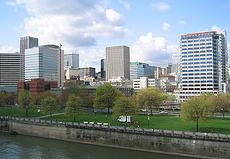The Portland City Council approved a new two percent hotel tax intended to help promote Portland tourism. The assessment applies to hotels with more than 50 rooms and takes effect on Oct. 1, 2012. Called the Portland Tourism Improvement District, the program will raise an estimated $6.6 million annually for tourism advertising, branding, promotions and sponsorships. City officials hope the fund will increase hotel occupancy, which in turn will increase a separate lodging tax collected by the city and county.
This will raise Portland’s tax rate to 14.5 percent, still lower than Seattle (15.6 percent), Denver (14.8 percent) and Austin (15 percent) according to Travel Portland.
A Travel Portland subcommittee of hotel representatives will determine how to better market travel to Portland. Hotel managers say getting more people to Portland won’t just help them fill their rooms, it will also help car rental companies get more customers, restaurants sell more appetizers and entrees, and it will help local stores in the spring and summer when they can’t count on holiday sales. Last year Portland’s economy picked up $3.8 billion from tourists.
The competition in the hotel business isn’t just across the street. It’s across the country. So when Seattle recently raised hotel taxes to pay for a marketing campaign, Embassy Suites General Manager Steve Jung took notice.
Jung told KATU’s Patrick Preston, “”We’re all fighting for tourism dollars, and I think when they have the ability to market as they’re doing, that puts them at an advantage,” he said.
Jung pushed Portland’s two percent hotel tax hike as a way to advertise the city, especially along the Interstate 5 corridor.
“We want to continue to make sure that Portland is front of mind for people in Seattle and in Vancouver,” he said.
Hotel guests don’t like paying the extra tax, but many say it won’t keep them from staying in Portland, especially since there is no sales tax.
The Center for Fiscal Accountability reports out of what the consumer pays, the hotel must cover costs for federal and state income taxes, federal payroll taxes, sales taxes, capital gains taxes, unemployment insurance taxes and workmen’s compensation taxes, business license taxes and fees, utility taxes, local property taxes, and any local income taxes. The hotel must also pay federal and state excise taxes on its telephones. These taxes add another $33.58 to the average cost of a hotel room.
As much as 50 percent of the cost of a hotel room pays for taxes. For an average one night stay costing $97.06, this means that up to $48.53 goes straight to the government.







